Tourism Plan Development: Australia's Opportunities and Challenges
VerifiedAdded on 2020/10/22
|17
|4520
|391
Report
AI Summary
This report provides an in-depth analysis of the need for a comprehensive tourism plan in Australia, focusing on the challenges and opportunities faced by the sector. It begins with a position statement from Intrepid Travel, outlining the company's values and the impact of climate change on its business. The report then delves into the background context, exploring the opportunities and challenges within Australia's tourism sector, including issues like political unrest, natural disasters, and changing customer behavior. It also discusses geographical delimitation, visitor numbers, and the drivers behind these issues. The statement of need highlights the requirement for a robust tourism plan, emphasizing the roles of government and business, key stakeholders, and influencing trends. The proposed plan scope covers possible policy approaches, resource requirements, benefits, and drawbacks. Finally, the report outlines the proposed process, including planning methods, consultation, and review members, providing a comprehensive overview of the considerations for developing and implementing a successful tourism plan for Australia, especially focusing on sustainable practices. This report underscores the importance of strategic destination management and the integration of sustainable practices to address environmental and social problems while fostering a high-quality tourist experience.
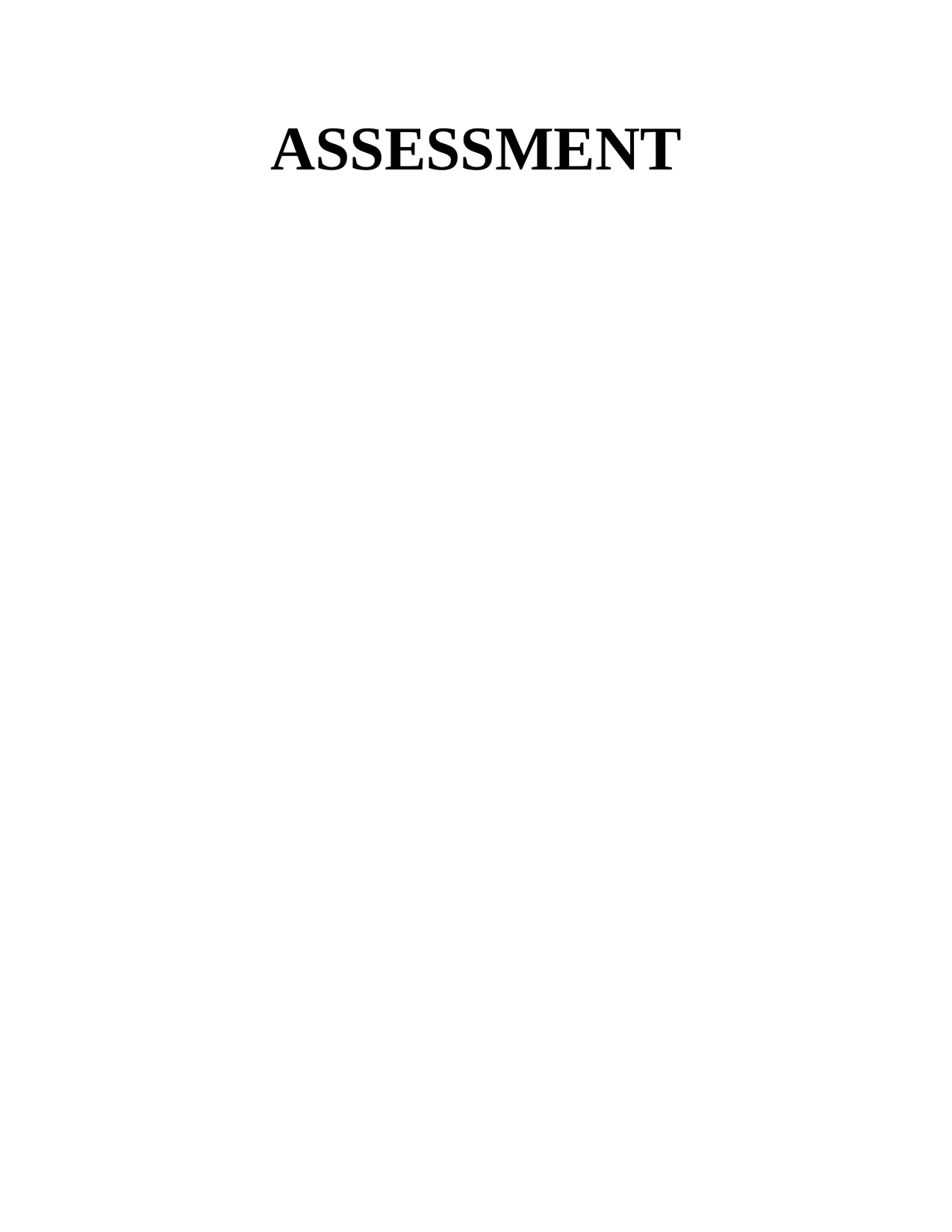
ASSESSMENT
Paraphrase This Document
Need a fresh take? Get an instant paraphrase of this document with our AI Paraphraser
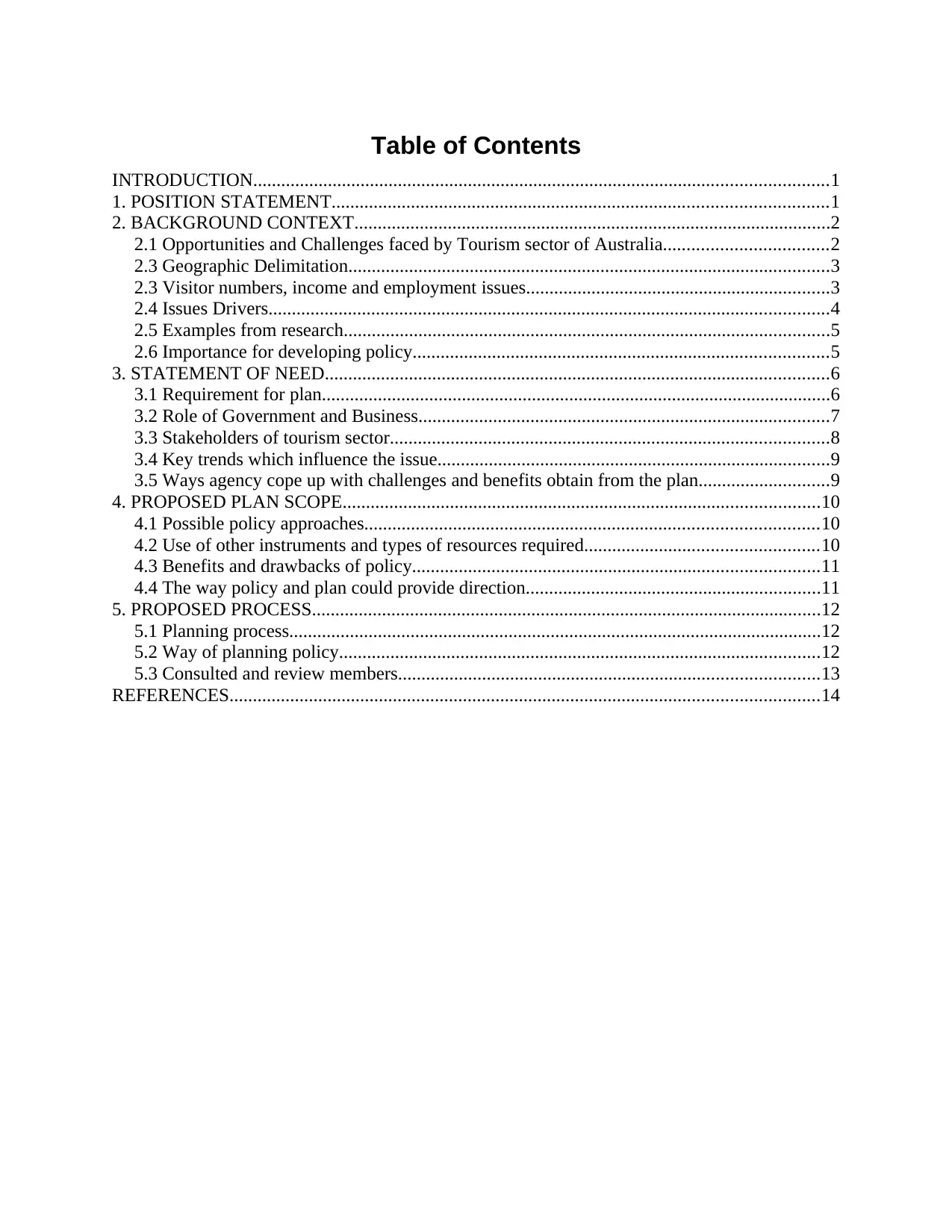
Table of Contents
INTRODUCTION...........................................................................................................................1
1. POSITION STATEMENT..........................................................................................................1
2. BACKGROUND CONTEXT......................................................................................................2
2.1 Opportunities and Challenges faced by Tourism sector of Australia...................................2
2.3 Geographic Delimitation.......................................................................................................3
2.3 Visitor numbers, income and employment issues.................................................................3
2.4 Issues Drivers........................................................................................................................4
2.5 Examples from research........................................................................................................5
2.6 Importance for developing policy.........................................................................................5
3. STATEMENT OF NEED............................................................................................................6
3.1 Requirement for plan.............................................................................................................6
3.2 Role of Government and Business........................................................................................7
3.3 Stakeholders of tourism sector..............................................................................................8
3.4 Key trends which influence the issue....................................................................................9
3.5 Ways agency cope up with challenges and benefits obtain from the plan............................9
4. PROPOSED PLAN SCOPE......................................................................................................10
4.1 Possible policy approaches.................................................................................................10
4.2 Use of other instruments and types of resources required..................................................10
4.3 Benefits and drawbacks of policy.......................................................................................11
4.4 The way policy and plan could provide direction...............................................................11
5. PROPOSED PROCESS.............................................................................................................12
5.1 Planning process..................................................................................................................12
5.2 Way of planning policy.......................................................................................................12
5.3 Consulted and review members..........................................................................................13
REFERENCES..............................................................................................................................14
INTRODUCTION...........................................................................................................................1
1. POSITION STATEMENT..........................................................................................................1
2. BACKGROUND CONTEXT......................................................................................................2
2.1 Opportunities and Challenges faced by Tourism sector of Australia...................................2
2.3 Geographic Delimitation.......................................................................................................3
2.3 Visitor numbers, income and employment issues.................................................................3
2.4 Issues Drivers........................................................................................................................4
2.5 Examples from research........................................................................................................5
2.6 Importance for developing policy.........................................................................................5
3. STATEMENT OF NEED............................................................................................................6
3.1 Requirement for plan.............................................................................................................6
3.2 Role of Government and Business........................................................................................7
3.3 Stakeholders of tourism sector..............................................................................................8
3.4 Key trends which influence the issue....................................................................................9
3.5 Ways agency cope up with challenges and benefits obtain from the plan............................9
4. PROPOSED PLAN SCOPE......................................................................................................10
4.1 Possible policy approaches.................................................................................................10
4.2 Use of other instruments and types of resources required..................................................10
4.3 Benefits and drawbacks of policy.......................................................................................11
4.4 The way policy and plan could provide direction...............................................................11
5. PROPOSED PROCESS.............................................................................................................12
5.1 Planning process..................................................................................................................12
5.2 Way of planning policy.......................................................................................................12
5.3 Consulted and review members..........................................................................................13
REFERENCES..............................................................................................................................14
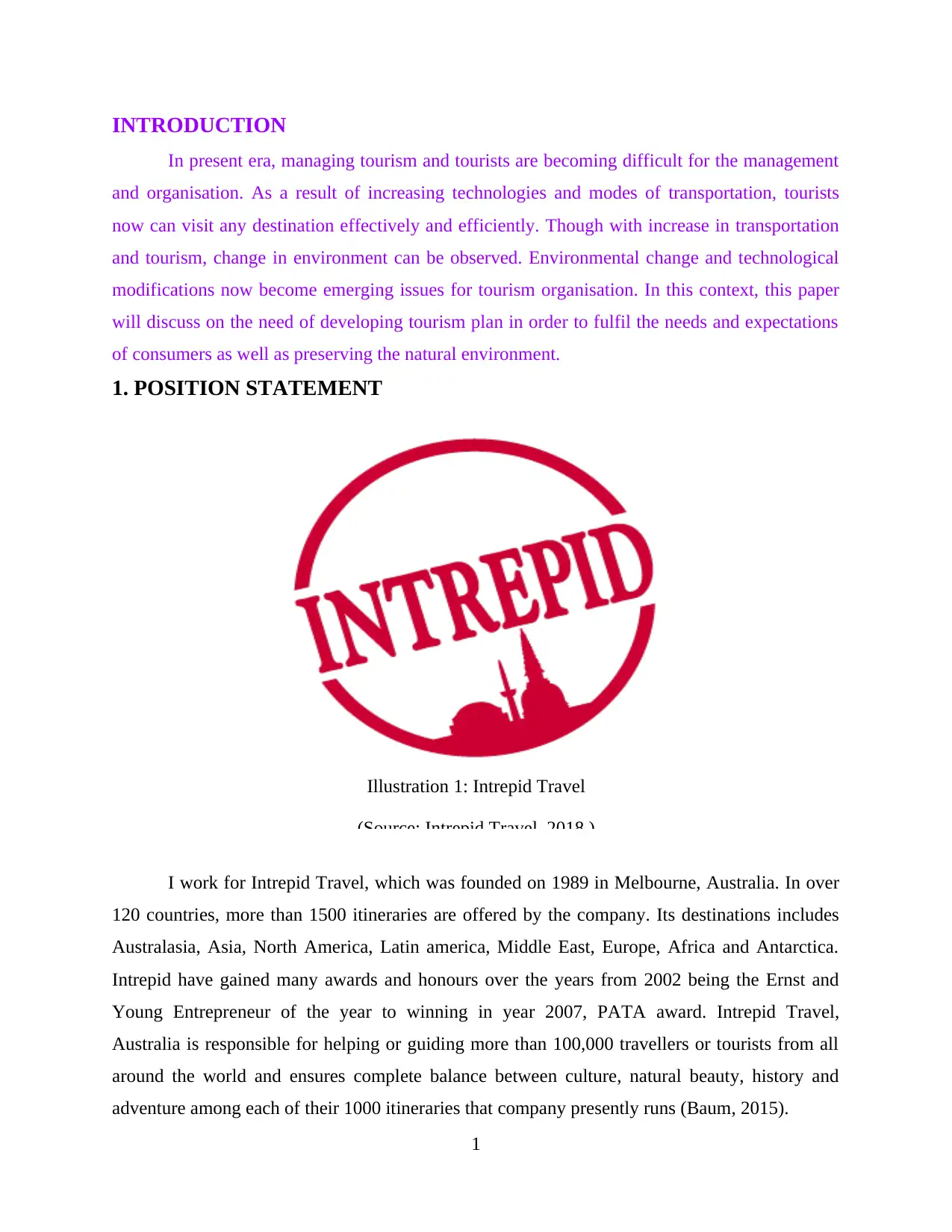
INTRODUCTION
In present era, managing tourism and tourists are becoming difficult for the management
and organisation. As a result of increasing technologies and modes of transportation, tourists
now can visit any destination effectively and efficiently. Though with increase in transportation
and tourism, change in environment can be observed. Environmental change and technological
modifications now become emerging issues for tourism organisation. In this context, this paper
will discuss on the need of developing tourism plan in order to fulfil the needs and expectations
of consumers as well as preserving the natural environment.
1. POSITION STATEMENT
I work for Intrepid Travel, which was founded on 1989 in Melbourne, Australia. In over
120 countries, more than 1500 itineraries are offered by the company. Its destinations includes
Australasia, Asia, North America, Latin america, Middle East, Europe, Africa and Antarctica.
Intrepid have gained many awards and honours over the years from 2002 being the Ernst and
Young Entrepreneur of the year to winning in year 2007, PATA award. Intrepid Travel,
Australia is responsible for helping or guiding more than 100,000 travellers or tourists from all
around the world and ensures complete balance between culture, natural beauty, history and
adventure among each of their 1000 itineraries that company presently runs (Baum, 2015).
1
Illustration 1: Intrepid Travel
(Source: Intrepid Travel, 2018 )
In present era, managing tourism and tourists are becoming difficult for the management
and organisation. As a result of increasing technologies and modes of transportation, tourists
now can visit any destination effectively and efficiently. Though with increase in transportation
and tourism, change in environment can be observed. Environmental change and technological
modifications now become emerging issues for tourism organisation. In this context, this paper
will discuss on the need of developing tourism plan in order to fulfil the needs and expectations
of consumers as well as preserving the natural environment.
1. POSITION STATEMENT
I work for Intrepid Travel, which was founded on 1989 in Melbourne, Australia. In over
120 countries, more than 1500 itineraries are offered by the company. Its destinations includes
Australasia, Asia, North America, Latin america, Middle East, Europe, Africa and Antarctica.
Intrepid have gained many awards and honours over the years from 2002 being the Ernst and
Young Entrepreneur of the year to winning in year 2007, PATA award. Intrepid Travel,
Australia is responsible for helping or guiding more than 100,000 travellers or tourists from all
around the world and ensures complete balance between culture, natural beauty, history and
adventure among each of their 1000 itineraries that company presently runs (Baum, 2015).
1
Illustration 1: Intrepid Travel
(Source: Intrepid Travel, 2018 )
⊘ This is a preview!⊘
Do you want full access?
Subscribe today to unlock all pages.

Trusted by 1+ million students worldwide
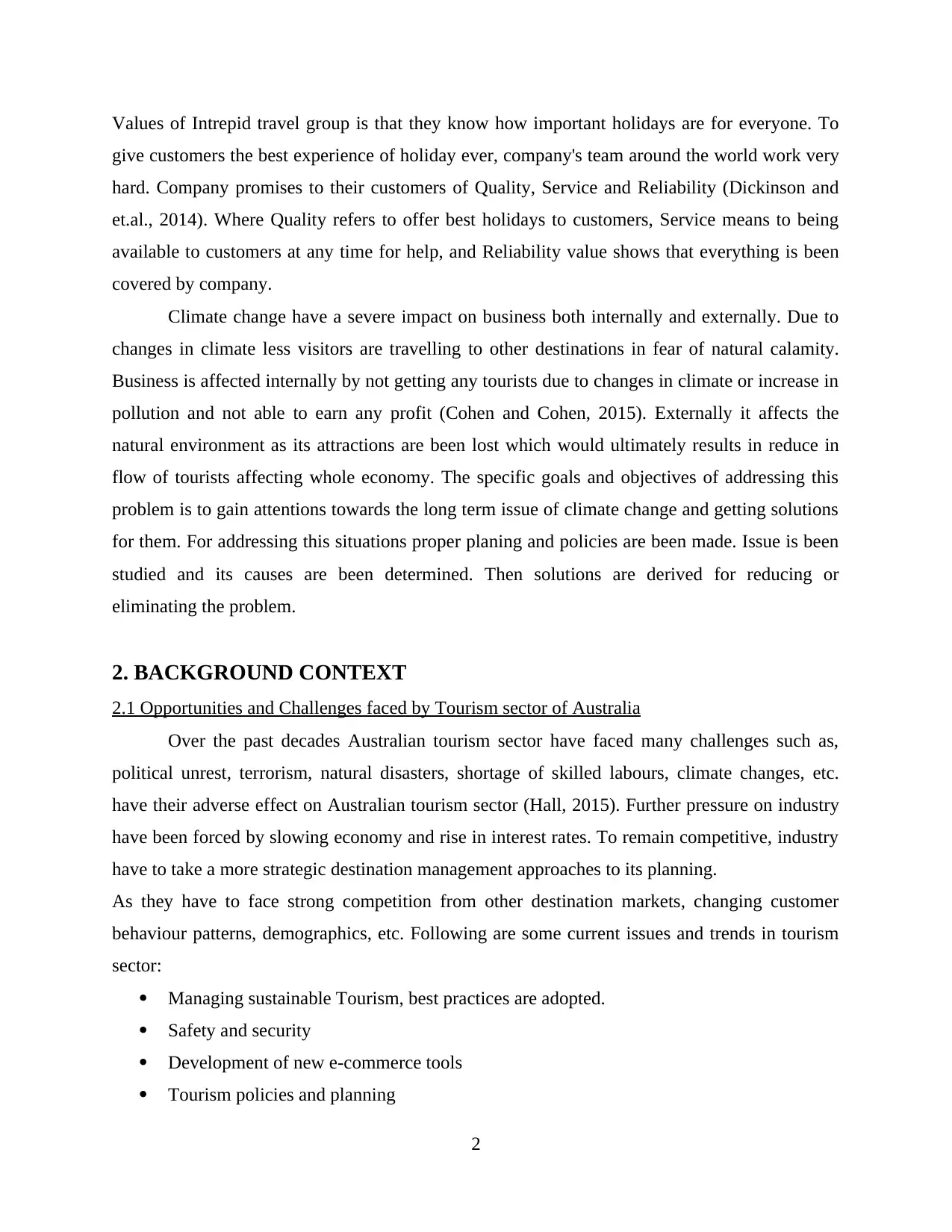
Values of Intrepid travel group is that they know how important holidays are for everyone. To
give customers the best experience of holiday ever, company's team around the world work very
hard. Company promises to their customers of Quality, Service and Reliability (Dickinson and
et.al., 2014). Where Quality refers to offer best holidays to customers, Service means to being
available to customers at any time for help, and Reliability value shows that everything is been
covered by company.
Climate change have a severe impact on business both internally and externally. Due to
changes in climate less visitors are travelling to other destinations in fear of natural calamity.
Business is affected internally by not getting any tourists due to changes in climate or increase in
pollution and not able to earn any profit (Cohen and Cohen, 2015). Externally it affects the
natural environment as its attractions are been lost which would ultimately results in reduce in
flow of tourists affecting whole economy. The specific goals and objectives of addressing this
problem is to gain attentions towards the long term issue of climate change and getting solutions
for them. For addressing this situations proper planing and policies are been made. Issue is been
studied and its causes are been determined. Then solutions are derived for reducing or
eliminating the problem.
2. BACKGROUND CONTEXT
2.1 Opportunities and Challenges faced by Tourism sector of Australia
Over the past decades Australian tourism sector have faced many challenges such as,
political unrest, terrorism, natural disasters, shortage of skilled labours, climate changes, etc.
have their adverse effect on Australian tourism sector (Hall, 2015). Further pressure on industry
have been forced by slowing economy and rise in interest rates. To remain competitive, industry
have to take a more strategic destination management approaches to its planning.
As they have to face strong competition from other destination markets, changing customer
behaviour patterns, demographics, etc. Following are some current issues and trends in tourism
sector:
Managing sustainable Tourism, best practices are adopted.
Safety and security
Development of new e-commerce tools
Tourism policies and planning
2
give customers the best experience of holiday ever, company's team around the world work very
hard. Company promises to their customers of Quality, Service and Reliability (Dickinson and
et.al., 2014). Where Quality refers to offer best holidays to customers, Service means to being
available to customers at any time for help, and Reliability value shows that everything is been
covered by company.
Climate change have a severe impact on business both internally and externally. Due to
changes in climate less visitors are travelling to other destinations in fear of natural calamity.
Business is affected internally by not getting any tourists due to changes in climate or increase in
pollution and not able to earn any profit (Cohen and Cohen, 2015). Externally it affects the
natural environment as its attractions are been lost which would ultimately results in reduce in
flow of tourists affecting whole economy. The specific goals and objectives of addressing this
problem is to gain attentions towards the long term issue of climate change and getting solutions
for them. For addressing this situations proper planing and policies are been made. Issue is been
studied and its causes are been determined. Then solutions are derived for reducing or
eliminating the problem.
2. BACKGROUND CONTEXT
2.1 Opportunities and Challenges faced by Tourism sector of Australia
Over the past decades Australian tourism sector have faced many challenges such as,
political unrest, terrorism, natural disasters, shortage of skilled labours, climate changes, etc.
have their adverse effect on Australian tourism sector (Hall, 2015). Further pressure on industry
have been forced by slowing economy and rise in interest rates. To remain competitive, industry
have to take a more strategic destination management approaches to its planning.
As they have to face strong competition from other destination markets, changing customer
behaviour patterns, demographics, etc. Following are some current issues and trends in tourism
sector:
Managing sustainable Tourism, best practices are adopted.
Safety and security
Development of new e-commerce tools
Tourism policies and planning
2
Paraphrase This Document
Need a fresh take? Get an instant paraphrase of this document with our AI Paraphraser
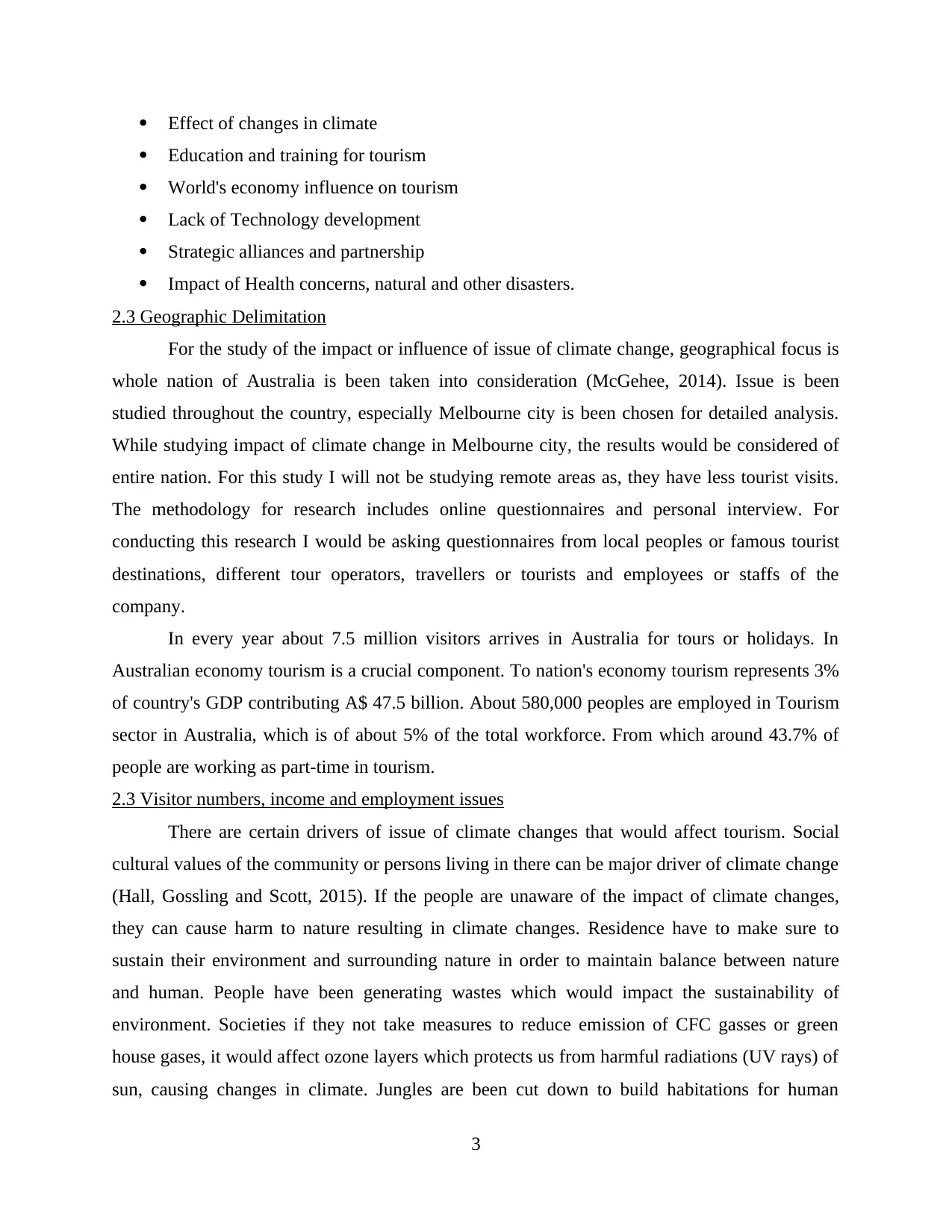
Effect of changes in climate
Education and training for tourism
World's economy influence on tourism
Lack of Technology development
Strategic alliances and partnership
Impact of Health concerns, natural and other disasters.
2.3 Geographic Delimitation
For the study of the impact or influence of issue of climate change, geographical focus is
whole nation of Australia is been taken into consideration (McGehee, 2014). Issue is been
studied throughout the country, especially Melbourne city is been chosen for detailed analysis.
While studying impact of climate change in Melbourne city, the results would be considered of
entire nation. For this study I will not be studying remote areas as, they have less tourist visits.
The methodology for research includes online questionnaires and personal interview. For
conducting this research I would be asking questionnaires from local peoples or famous tourist
destinations, different tour operators, travellers or tourists and employees or staffs of the
company.
In every year about 7.5 million visitors arrives in Australia for tours or holidays. In
Australian economy tourism is a crucial component. To nation's economy tourism represents 3%
of country's GDP contributing A$ 47.5 billion. About 580,000 peoples are employed in Tourism
sector in Australia, which is of about 5% of the total workforce. From which around 43.7% of
people are working as part-time in tourism.
2.3 Visitor numbers, income and employment issues
There are certain drivers of issue of climate changes that would affect tourism. Social
cultural values of the community or persons living in there can be major driver of climate change
(Hall, Gossling and Scott, 2015). If the people are unaware of the impact of climate changes,
they can cause harm to nature resulting in climate changes. Residence have to make sure to
sustain their environment and surrounding nature in order to maintain balance between nature
and human. People have been generating wastes which would impact the sustainability of
environment. Societies if they not take measures to reduce emission of CFC gasses or green
house gases, it would affect ozone layers which protects us from harmful radiations (UV rays) of
sun, causing changes in climate. Jungles are been cut down to build habitations for human
3
Education and training for tourism
World's economy influence on tourism
Lack of Technology development
Strategic alliances and partnership
Impact of Health concerns, natural and other disasters.
2.3 Geographic Delimitation
For the study of the impact or influence of issue of climate change, geographical focus is
whole nation of Australia is been taken into consideration (McGehee, 2014). Issue is been
studied throughout the country, especially Melbourne city is been chosen for detailed analysis.
While studying impact of climate change in Melbourne city, the results would be considered of
entire nation. For this study I will not be studying remote areas as, they have less tourist visits.
The methodology for research includes online questionnaires and personal interview. For
conducting this research I would be asking questionnaires from local peoples or famous tourist
destinations, different tour operators, travellers or tourists and employees or staffs of the
company.
In every year about 7.5 million visitors arrives in Australia for tours or holidays. In
Australian economy tourism is a crucial component. To nation's economy tourism represents 3%
of country's GDP contributing A$ 47.5 billion. About 580,000 peoples are employed in Tourism
sector in Australia, which is of about 5% of the total workforce. From which around 43.7% of
people are working as part-time in tourism.
2.3 Visitor numbers, income and employment issues
There are certain drivers of issue of climate changes that would affect tourism. Social
cultural values of the community or persons living in there can be major driver of climate change
(Hall, Gossling and Scott, 2015). If the people are unaware of the impact of climate changes,
they can cause harm to nature resulting in climate changes. Residence have to make sure to
sustain their environment and surrounding nature in order to maintain balance between nature
and human. People have been generating wastes which would impact the sustainability of
environment. Societies if they not take measures to reduce emission of CFC gasses or green
house gases, it would affect ozone layers which protects us from harmful radiations (UV rays) of
sun, causing changes in climate. Jungles are been cut down to build habitations for human
3
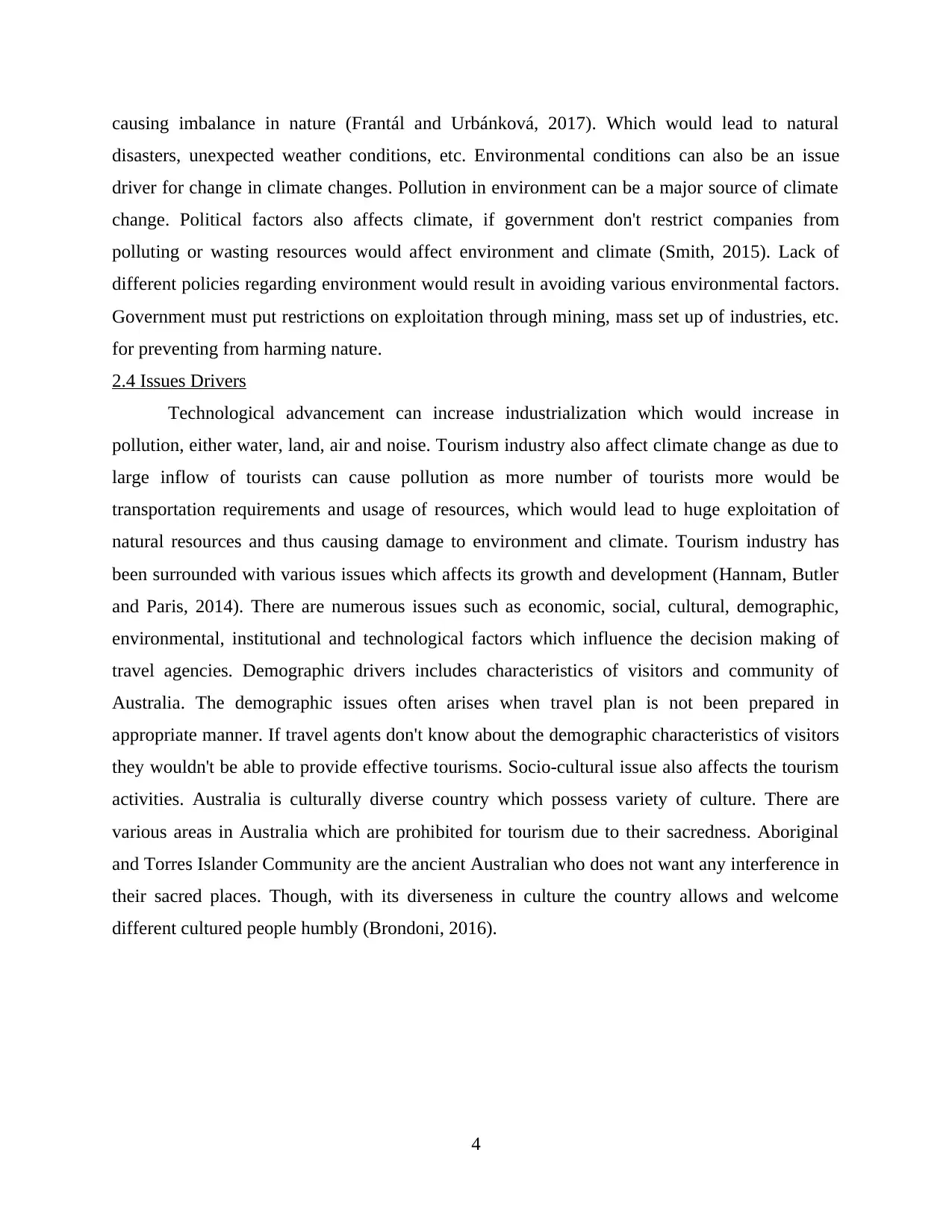
causing imbalance in nature (Frantál and Urbánková, 2017). Which would lead to natural
disasters, unexpected weather conditions, etc. Environmental conditions can also be an issue
driver for change in climate changes. Pollution in environment can be a major source of climate
change. Political factors also affects climate, if government don't restrict companies from
polluting or wasting resources would affect environment and climate (Smith, 2015). Lack of
different policies regarding environment would result in avoiding various environmental factors.
Government must put restrictions on exploitation through mining, mass set up of industries, etc.
for preventing from harming nature.
2.4 Issues Drivers
Technological advancement can increase industrialization which would increase in
pollution, either water, land, air and noise. Tourism industry also affect climate change as due to
large inflow of tourists can cause pollution as more number of tourists more would be
transportation requirements and usage of resources, which would lead to huge exploitation of
natural resources and thus causing damage to environment and climate. Tourism industry has
been surrounded with various issues which affects its growth and development (Hannam, Butler
and Paris, 2014). There are numerous issues such as economic, social, cultural, demographic,
environmental, institutional and technological factors which influence the decision making of
travel agencies. Demographic drivers includes characteristics of visitors and community of
Australia. The demographic issues often arises when travel plan is not been prepared in
appropriate manner. If travel agents don't know about the demographic characteristics of visitors
they wouldn't be able to provide effective tourisms. Socio-cultural issue also affects the tourism
activities. Australia is culturally diverse country which possess variety of culture. There are
various areas in Australia which are prohibited for tourism due to their sacredness. Aboriginal
and Torres Islander Community are the ancient Australian who does not want any interference in
their sacred places. Though, with its diverseness in culture the country allows and welcome
different cultured people humbly (Brondoni, 2016).
4
disasters, unexpected weather conditions, etc. Environmental conditions can also be an issue
driver for change in climate changes. Pollution in environment can be a major source of climate
change. Political factors also affects climate, if government don't restrict companies from
polluting or wasting resources would affect environment and climate (Smith, 2015). Lack of
different policies regarding environment would result in avoiding various environmental factors.
Government must put restrictions on exploitation through mining, mass set up of industries, etc.
for preventing from harming nature.
2.4 Issues Drivers
Technological advancement can increase industrialization which would increase in
pollution, either water, land, air and noise. Tourism industry also affect climate change as due to
large inflow of tourists can cause pollution as more number of tourists more would be
transportation requirements and usage of resources, which would lead to huge exploitation of
natural resources and thus causing damage to environment and climate. Tourism industry has
been surrounded with various issues which affects its growth and development (Hannam, Butler
and Paris, 2014). There are numerous issues such as economic, social, cultural, demographic,
environmental, institutional and technological factors which influence the decision making of
travel agencies. Demographic drivers includes characteristics of visitors and community of
Australia. The demographic issues often arises when travel plan is not been prepared in
appropriate manner. If travel agents don't know about the demographic characteristics of visitors
they wouldn't be able to provide effective tourisms. Socio-cultural issue also affects the tourism
activities. Australia is culturally diverse country which possess variety of culture. There are
various areas in Australia which are prohibited for tourism due to their sacredness. Aboriginal
and Torres Islander Community are the ancient Australian who does not want any interference in
their sacred places. Though, with its diverseness in culture the country allows and welcome
different cultured people humbly (Brondoni, 2016).
4
⊘ This is a preview!⊘
Do you want full access?
Subscribe today to unlock all pages.

Trusted by 1+ million students worldwide
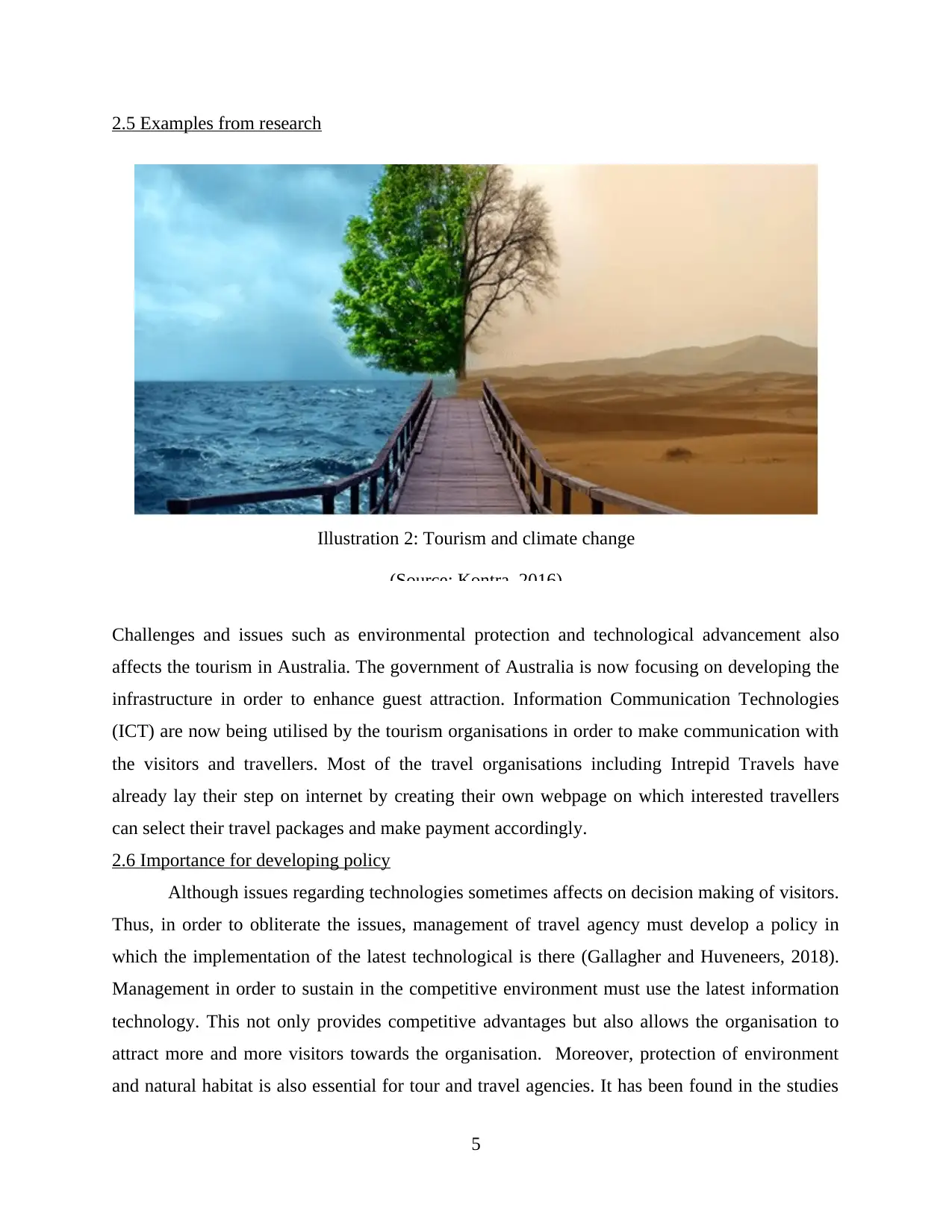
2.5 Examples from research
Challenges and issues such as environmental protection and technological advancement also
affects the tourism in Australia. The government of Australia is now focusing on developing the
infrastructure in order to enhance guest attraction. Information Communication Technologies
(ICT) are now being utilised by the tourism organisations in order to make communication with
the visitors and travellers. Most of the travel organisations including Intrepid Travels have
already lay their step on internet by creating their own webpage on which interested travellers
can select their travel packages and make payment accordingly.
2.6 Importance for developing policy
Although issues regarding technologies sometimes affects on decision making of visitors.
Thus, in order to obliterate the issues, management of travel agency must develop a policy in
which the implementation of the latest technological is there (Gallagher and Huveneers, 2018).
Management in order to sustain in the competitive environment must use the latest information
technology. This not only provides competitive advantages but also allows the organisation to
attract more and more visitors towards the organisation. Moreover, protection of environment
and natural habitat is also essential for tour and travel agencies. It has been found in the studies
5
Illustration 2: Tourism and climate change
(Source: Kontra, 2016)
Challenges and issues such as environmental protection and technological advancement also
affects the tourism in Australia. The government of Australia is now focusing on developing the
infrastructure in order to enhance guest attraction. Information Communication Technologies
(ICT) are now being utilised by the tourism organisations in order to make communication with
the visitors and travellers. Most of the travel organisations including Intrepid Travels have
already lay their step on internet by creating their own webpage on which interested travellers
can select their travel packages and make payment accordingly.
2.6 Importance for developing policy
Although issues regarding technologies sometimes affects on decision making of visitors.
Thus, in order to obliterate the issues, management of travel agency must develop a policy in
which the implementation of the latest technological is there (Gallagher and Huveneers, 2018).
Management in order to sustain in the competitive environment must use the latest information
technology. This not only provides competitive advantages but also allows the organisation to
attract more and more visitors towards the organisation. Moreover, protection of environment
and natural habitat is also essential for tour and travel agencies. It has been found in the studies
5
Illustration 2: Tourism and climate change
(Source: Kontra, 2016)
Paraphrase This Document
Need a fresh take? Get an instant paraphrase of this document with our AI Paraphraser
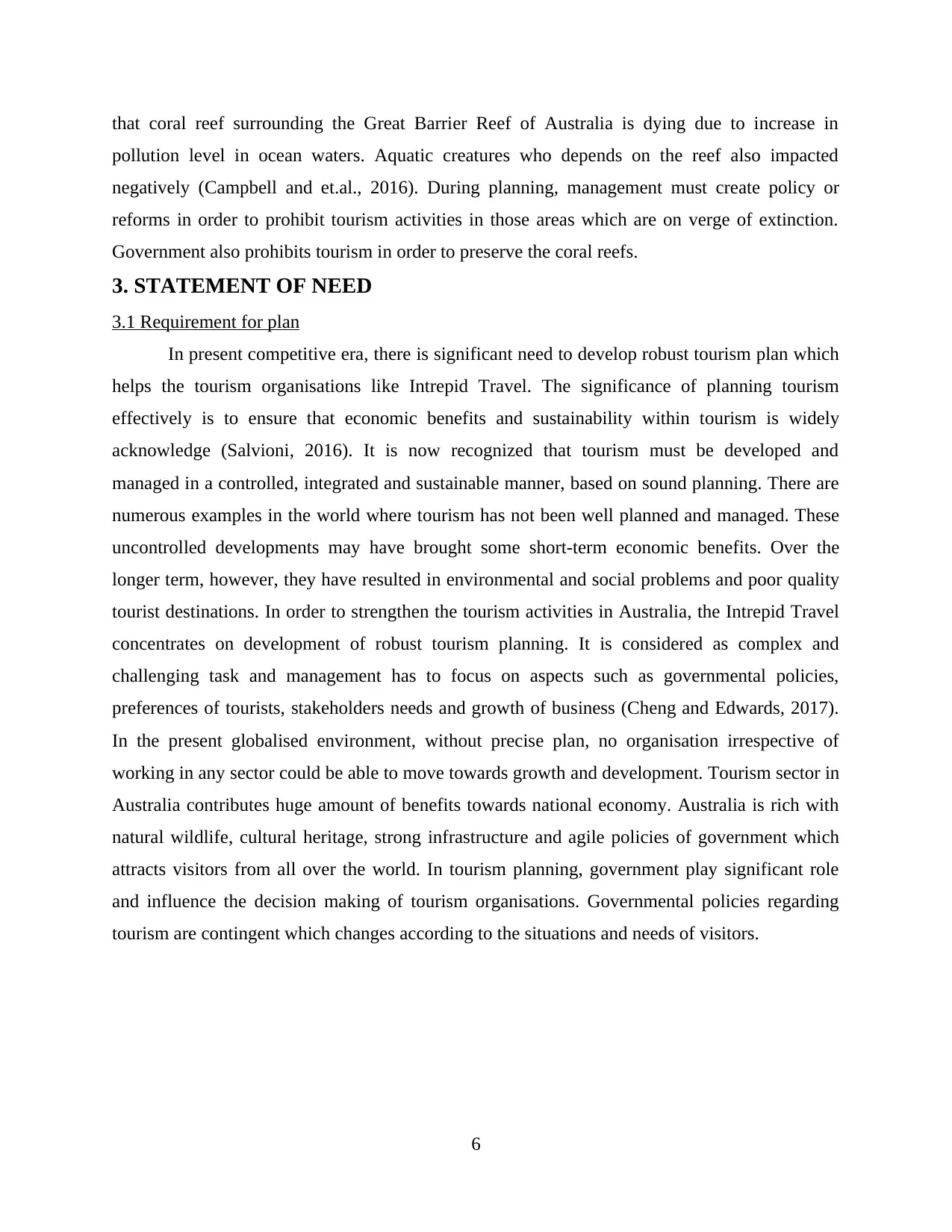
that coral reef surrounding the Great Barrier Reef of Australia is dying due to increase in
pollution level in ocean waters. Aquatic creatures who depends on the reef also impacted
negatively (Campbell and et.al., 2016). During planning, management must create policy or
reforms in order to prohibit tourism activities in those areas which are on verge of extinction.
Government also prohibits tourism in order to preserve the coral reefs.
3. STATEMENT OF NEED
3.1 Requirement for plan
In present competitive era, there is significant need to develop robust tourism plan which
helps the tourism organisations like Intrepid Travel. The significance of planning tourism
effectively is to ensure that economic benefits and sustainability within tourism is widely
acknowledge (Salvioni, 2016). It is now recognized that tourism must be developed and
managed in a controlled, integrated and sustainable manner, based on sound planning. There are
numerous examples in the world where tourism has not been well planned and managed. These
uncontrolled developments may have brought some short-term economic benefits. Over the
longer term, however, they have resulted in environmental and social problems and poor quality
tourist destinations. In order to strengthen the tourism activities in Australia, the Intrepid Travel
concentrates on development of robust tourism planning. It is considered as complex and
challenging task and management has to focus on aspects such as governmental policies,
preferences of tourists, stakeholders needs and growth of business (Cheng and Edwards, 2017).
In the present globalised environment, without precise plan, no organisation irrespective of
working in any sector could be able to move towards growth and development. Tourism sector in
Australia contributes huge amount of benefits towards national economy. Australia is rich with
natural wildlife, cultural heritage, strong infrastructure and agile policies of government which
attracts visitors from all over the world. In tourism planning, government play significant role
and influence the decision making of tourism organisations. Governmental policies regarding
tourism are contingent which changes according to the situations and needs of visitors.
6
pollution level in ocean waters. Aquatic creatures who depends on the reef also impacted
negatively (Campbell and et.al., 2016). During planning, management must create policy or
reforms in order to prohibit tourism activities in those areas which are on verge of extinction.
Government also prohibits tourism in order to preserve the coral reefs.
3. STATEMENT OF NEED
3.1 Requirement for plan
In present competitive era, there is significant need to develop robust tourism plan which
helps the tourism organisations like Intrepid Travel. The significance of planning tourism
effectively is to ensure that economic benefits and sustainability within tourism is widely
acknowledge (Salvioni, 2016). It is now recognized that tourism must be developed and
managed in a controlled, integrated and sustainable manner, based on sound planning. There are
numerous examples in the world where tourism has not been well planned and managed. These
uncontrolled developments may have brought some short-term economic benefits. Over the
longer term, however, they have resulted in environmental and social problems and poor quality
tourist destinations. In order to strengthen the tourism activities in Australia, the Intrepid Travel
concentrates on development of robust tourism planning. It is considered as complex and
challenging task and management has to focus on aspects such as governmental policies,
preferences of tourists, stakeholders needs and growth of business (Cheng and Edwards, 2017).
In the present globalised environment, without precise plan, no organisation irrespective of
working in any sector could be able to move towards growth and development. Tourism sector in
Australia contributes huge amount of benefits towards national economy. Australia is rich with
natural wildlife, cultural heritage, strong infrastructure and agile policies of government which
attracts visitors from all over the world. In tourism planning, government play significant role
and influence the decision making of tourism organisations. Governmental policies regarding
tourism are contingent which changes according to the situations and needs of visitors.
6
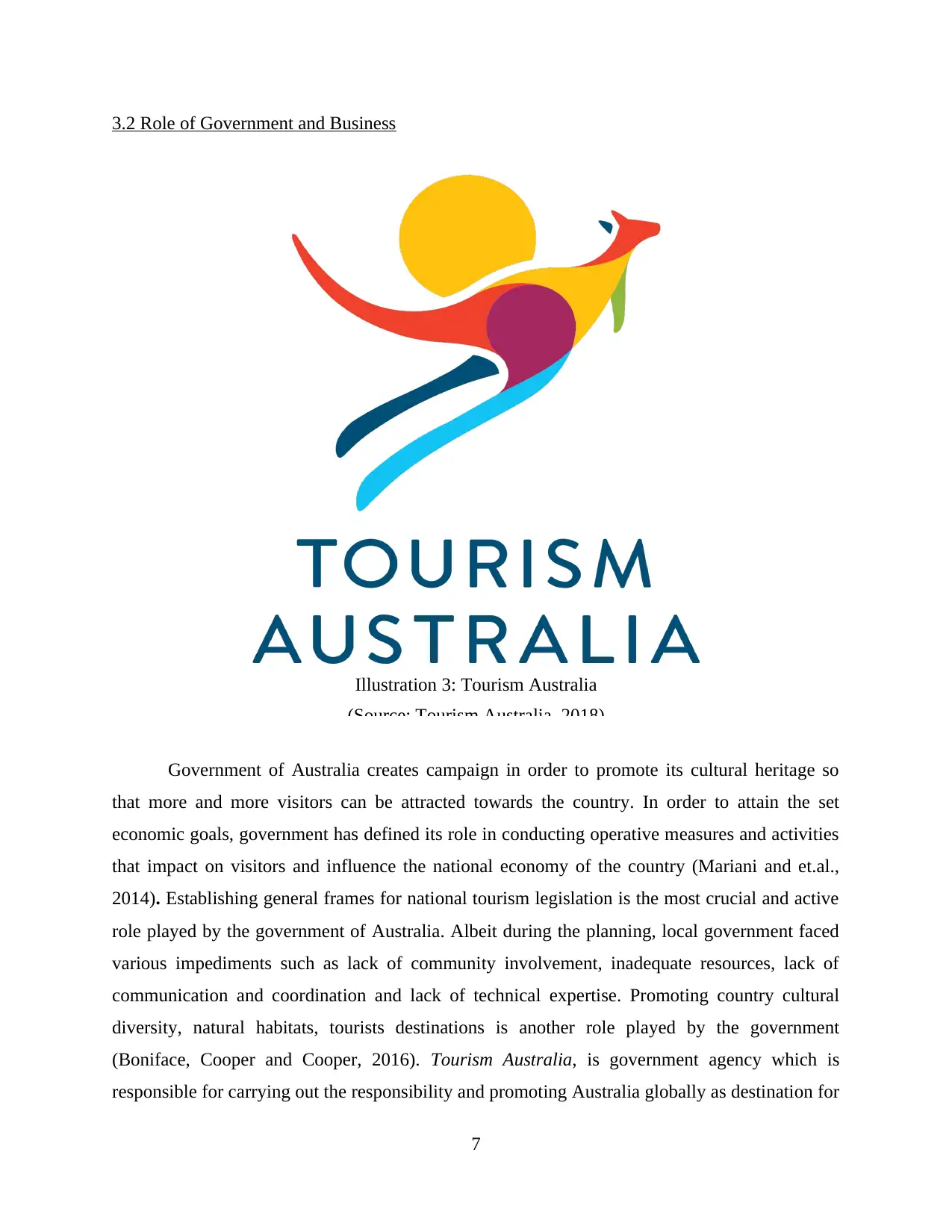
3.2 Role of Government and Business
Government of Australia creates campaign in order to promote its cultural heritage so
that more and more visitors can be attracted towards the country. In order to attain the set
economic goals, government has defined its role in conducting operative measures and activities
that impact on visitors and influence the national economy of the country (Mariani and et.al.,
2014). Establishing general frames for national tourism legislation is the most crucial and active
role played by the government of Australia. Albeit during the planning, local government faced
various impediments such as lack of community involvement, inadequate resources, lack of
communication and coordination and lack of technical expertise. Promoting country cultural
diversity, natural habitats, tourists destinations is another role played by the government
(Boniface, Cooper and Cooper, 2016). Tourism Australia, is government agency which is
responsible for carrying out the responsibility and promoting Australia globally as destination for
7
Illustration 3: Tourism Australia
(Source: Tourism Australia, 2018)
Government of Australia creates campaign in order to promote its cultural heritage so
that more and more visitors can be attracted towards the country. In order to attain the set
economic goals, government has defined its role in conducting operative measures and activities
that impact on visitors and influence the national economy of the country (Mariani and et.al.,
2014). Establishing general frames for national tourism legislation is the most crucial and active
role played by the government of Australia. Albeit during the planning, local government faced
various impediments such as lack of community involvement, inadequate resources, lack of
communication and coordination and lack of technical expertise. Promoting country cultural
diversity, natural habitats, tourists destinations is another role played by the government
(Boniface, Cooper and Cooper, 2016). Tourism Australia, is government agency which is
responsible for carrying out the responsibility and promoting Australia globally as destination for
7
Illustration 3: Tourism Australia
(Source: Tourism Australia, 2018)
⊘ This is a preview!⊘
Do you want full access?
Subscribe today to unlock all pages.

Trusted by 1+ million students worldwide
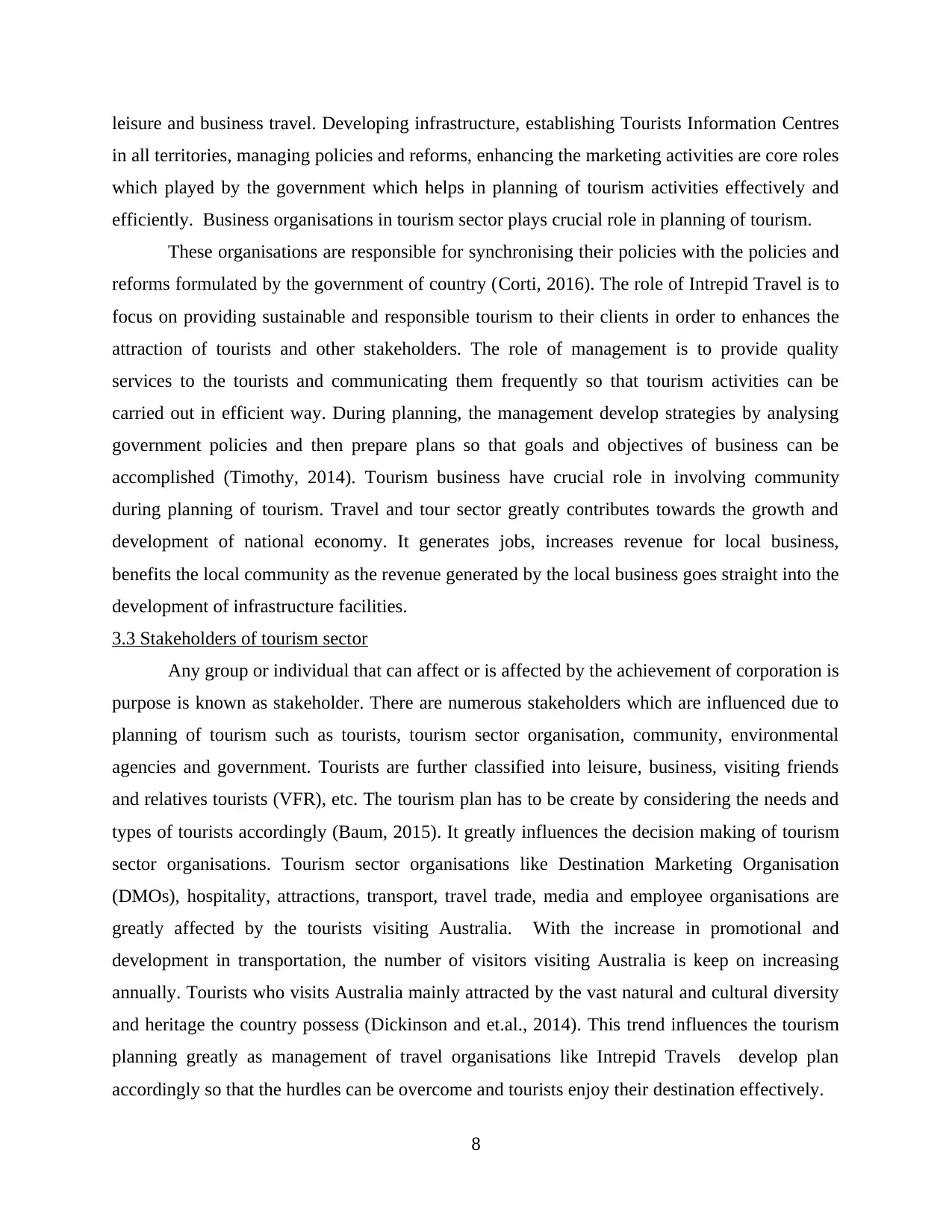
leisure and business travel. Developing infrastructure, establishing Tourists Information Centres
in all territories, managing policies and reforms, enhancing the marketing activities are core roles
which played by the government which helps in planning of tourism activities effectively and
efficiently. Business organisations in tourism sector plays crucial role in planning of tourism.
These organisations are responsible for synchronising their policies with the policies and
reforms formulated by the government of country (Corti, 2016). The role of Intrepid Travel is to
focus on providing sustainable and responsible tourism to their clients in order to enhances the
attraction of tourists and other stakeholders. The role of management is to provide quality
services to the tourists and communicating them frequently so that tourism activities can be
carried out in efficient way. During planning, the management develop strategies by analysing
government policies and then prepare plans so that goals and objectives of business can be
accomplished (Timothy, 2014). Tourism business have crucial role in involving community
during planning of tourism. Travel and tour sector greatly contributes towards the growth and
development of national economy. It generates jobs, increases revenue for local business,
benefits the local community as the revenue generated by the local business goes straight into the
development of infrastructure facilities.
3.3 Stakeholders of tourism sector
Any group or individual that can affect or is affected by the achievement of corporation is
purpose is known as stakeholder. There are numerous stakeholders which are influenced due to
planning of tourism such as tourists, tourism sector organisation, community, environmental
agencies and government. Tourists are further classified into leisure, business, visiting friends
and relatives tourists (VFR), etc. The tourism plan has to be create by considering the needs and
types of tourists accordingly (Baum, 2015). It greatly influences the decision making of tourism
sector organisations. Tourism sector organisations like Destination Marketing Organisation
(DMOs), hospitality, attractions, transport, travel trade, media and employee organisations are
greatly affected by the tourists visiting Australia. With the increase in promotional and
development in transportation, the number of visitors visiting Australia is keep on increasing
annually. Tourists who visits Australia mainly attracted by the vast natural and cultural diversity
and heritage the country possess (Dickinson and et.al., 2014). This trend influences the tourism
planning greatly as management of travel organisations like Intrepid Travels develop plan
accordingly so that the hurdles can be overcome and tourists enjoy their destination effectively.
8
in all territories, managing policies and reforms, enhancing the marketing activities are core roles
which played by the government which helps in planning of tourism activities effectively and
efficiently. Business organisations in tourism sector plays crucial role in planning of tourism.
These organisations are responsible for synchronising their policies with the policies and
reforms formulated by the government of country (Corti, 2016). The role of Intrepid Travel is to
focus on providing sustainable and responsible tourism to their clients in order to enhances the
attraction of tourists and other stakeholders. The role of management is to provide quality
services to the tourists and communicating them frequently so that tourism activities can be
carried out in efficient way. During planning, the management develop strategies by analysing
government policies and then prepare plans so that goals and objectives of business can be
accomplished (Timothy, 2014). Tourism business have crucial role in involving community
during planning of tourism. Travel and tour sector greatly contributes towards the growth and
development of national economy. It generates jobs, increases revenue for local business,
benefits the local community as the revenue generated by the local business goes straight into the
development of infrastructure facilities.
3.3 Stakeholders of tourism sector
Any group or individual that can affect or is affected by the achievement of corporation is
purpose is known as stakeholder. There are numerous stakeholders which are influenced due to
planning of tourism such as tourists, tourism sector organisation, community, environmental
agencies and government. Tourists are further classified into leisure, business, visiting friends
and relatives tourists (VFR), etc. The tourism plan has to be create by considering the needs and
types of tourists accordingly (Baum, 2015). It greatly influences the decision making of tourism
sector organisations. Tourism sector organisations like Destination Marketing Organisation
(DMOs), hospitality, attractions, transport, travel trade, media and employee organisations are
greatly affected by the tourists visiting Australia. With the increase in promotional and
development in transportation, the number of visitors visiting Australia is keep on increasing
annually. Tourists who visits Australia mainly attracted by the vast natural and cultural diversity
and heritage the country possess (Dickinson and et.al., 2014). This trend influences the tourism
planning greatly as management of travel organisations like Intrepid Travels develop plan
accordingly so that the hurdles can be overcome and tourists enjoy their destination effectively.
8
Paraphrase This Document
Need a fresh take? Get an instant paraphrase of this document with our AI Paraphraser
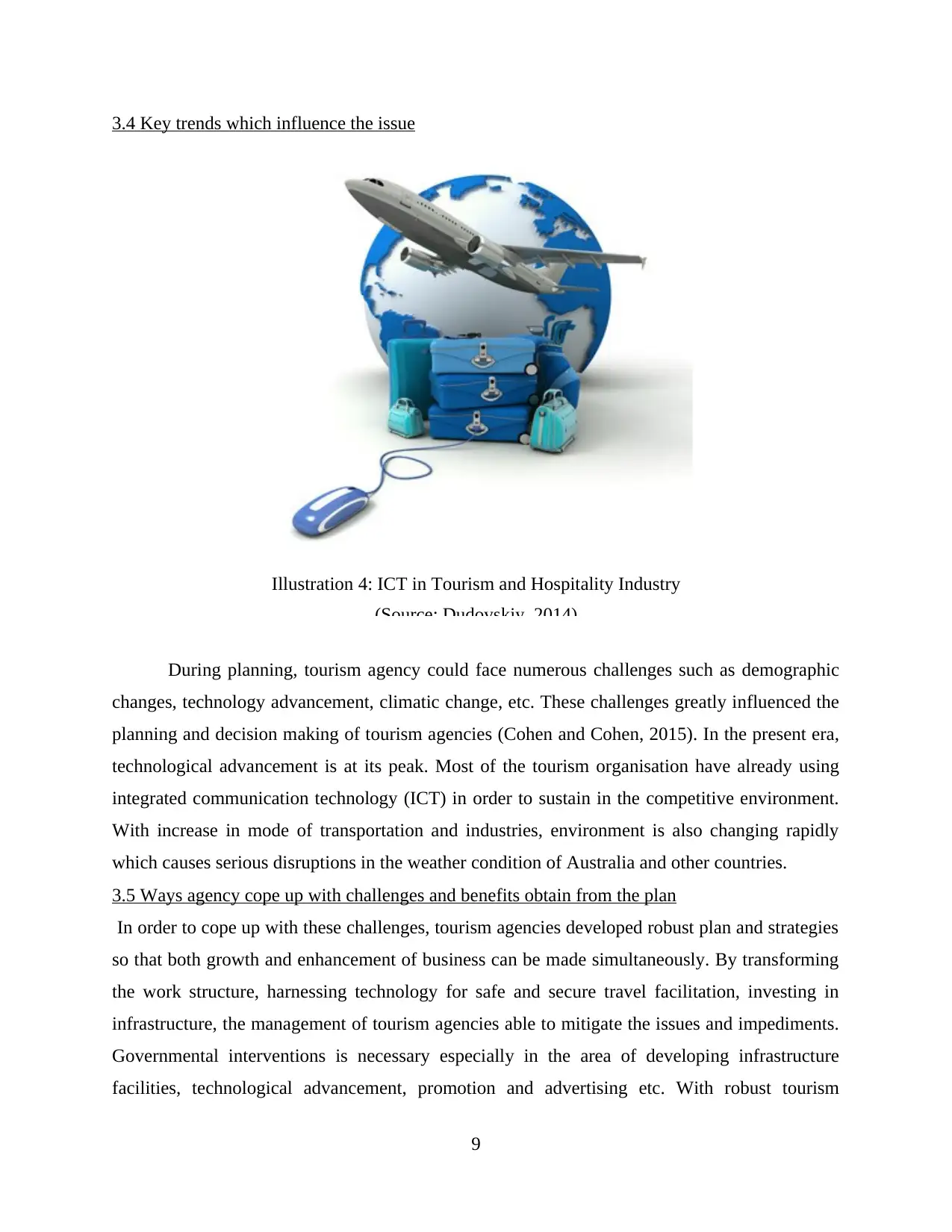
3.4 Key trends which influence the issue
During planning, tourism agency could face numerous challenges such as demographic
changes, technology advancement, climatic change, etc. These challenges greatly influenced the
planning and decision making of tourism agencies (Cohen and Cohen, 2015). In the present era,
technological advancement is at its peak. Most of the tourism organisation have already using
integrated communication technology (ICT) in order to sustain in the competitive environment.
With increase in mode of transportation and industries, environment is also changing rapidly
which causes serious disruptions in the weather condition of Australia and other countries.
3.5 Ways agency cope up with challenges and benefits obtain from the plan
In order to cope up with these challenges, tourism agencies developed robust plan and strategies
so that both growth and enhancement of business can be made simultaneously. By transforming
the work structure, harnessing technology for safe and secure travel facilitation, investing in
infrastructure, the management of tourism agencies able to mitigate the issues and impediments.
Governmental interventions is necessary especially in the area of developing infrastructure
facilities, technological advancement, promotion and advertising etc. With robust tourism
9
Illustration 4: ICT in Tourism and Hospitality Industry
(Source: Dudovskiy, 2014)
During planning, tourism agency could face numerous challenges such as demographic
changes, technology advancement, climatic change, etc. These challenges greatly influenced the
planning and decision making of tourism agencies (Cohen and Cohen, 2015). In the present era,
technological advancement is at its peak. Most of the tourism organisation have already using
integrated communication technology (ICT) in order to sustain in the competitive environment.
With increase in mode of transportation and industries, environment is also changing rapidly
which causes serious disruptions in the weather condition of Australia and other countries.
3.5 Ways agency cope up with challenges and benefits obtain from the plan
In order to cope up with these challenges, tourism agencies developed robust plan and strategies
so that both growth and enhancement of business can be made simultaneously. By transforming
the work structure, harnessing technology for safe and secure travel facilitation, investing in
infrastructure, the management of tourism agencies able to mitigate the issues and impediments.
Governmental interventions is necessary especially in the area of developing infrastructure
facilities, technological advancement, promotion and advertising etc. With robust tourism
9
Illustration 4: ICT in Tourism and Hospitality Industry
(Source: Dudovskiy, 2014)
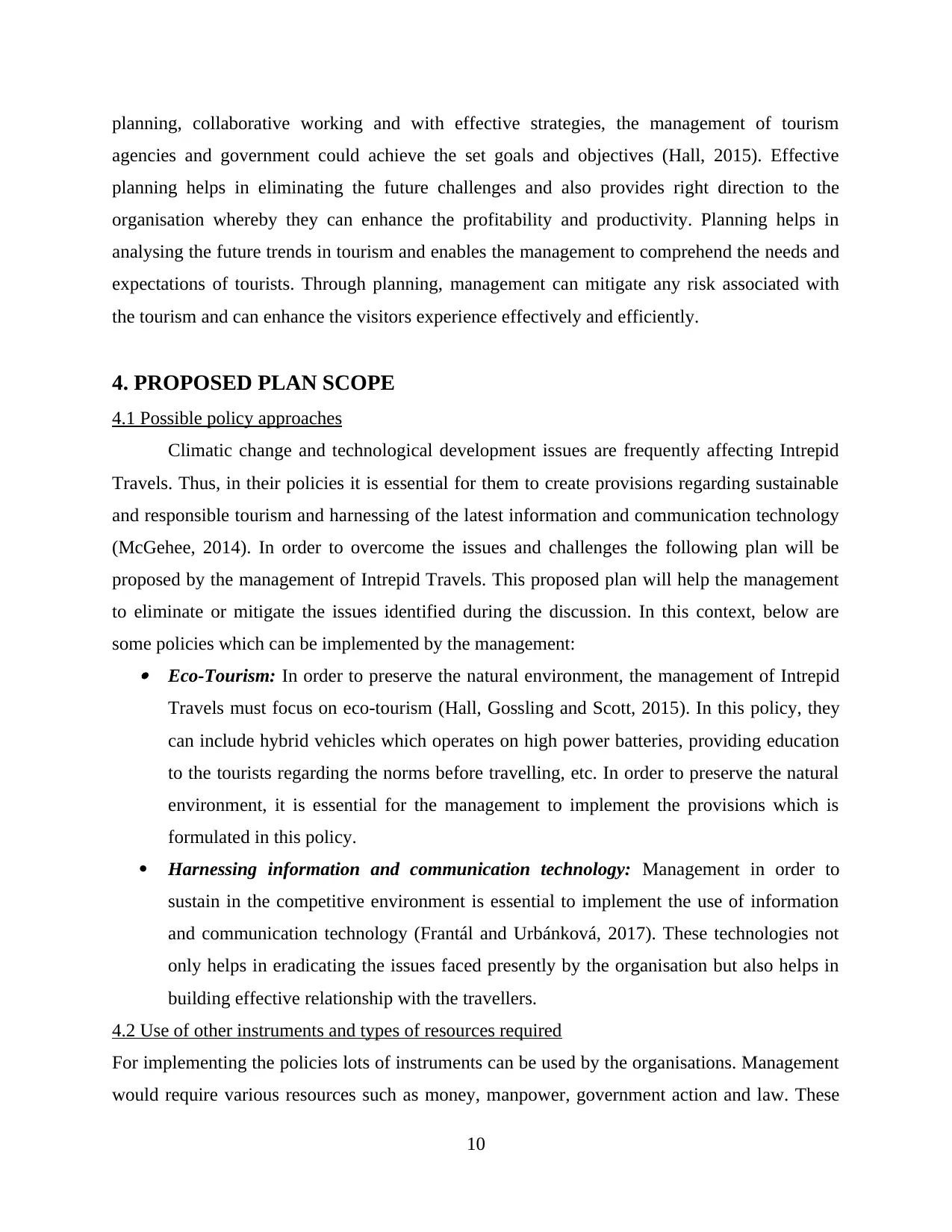
planning, collaborative working and with effective strategies, the management of tourism
agencies and government could achieve the set goals and objectives (Hall, 2015). Effective
planning helps in eliminating the future challenges and also provides right direction to the
organisation whereby they can enhance the profitability and productivity. Planning helps in
analysing the future trends in tourism and enables the management to comprehend the needs and
expectations of tourists. Through planning, management can mitigate any risk associated with
the tourism and can enhance the visitors experience effectively and efficiently.
4. PROPOSED PLAN SCOPE
4.1 Possible policy approaches
Climatic change and technological development issues are frequently affecting Intrepid
Travels. Thus, in their policies it is essential for them to create provisions regarding sustainable
and responsible tourism and harnessing of the latest information and communication technology
(McGehee, 2014). In order to overcome the issues and challenges the following plan will be
proposed by the management of Intrepid Travels. This proposed plan will help the management
to eliminate or mitigate the issues identified during the discussion. In this context, below are
some policies which can be implemented by the management: Eco-Tourism: In order to preserve the natural environment, the management of Intrepid
Travels must focus on eco-tourism (Hall, Gossling and Scott, 2015). In this policy, they
can include hybrid vehicles which operates on high power batteries, providing education
to the tourists regarding the norms before travelling, etc. In order to preserve the natural
environment, it is essential for the management to implement the provisions which is
formulated in this policy.
Harnessing information and communication technology: Management in order to
sustain in the competitive environment is essential to implement the use of information
and communication technology (Frantál and Urbánková, 2017). These technologies not
only helps in eradicating the issues faced presently by the organisation but also helps in
building effective relationship with the travellers.
4.2 Use of other instruments and types of resources required
For implementing the policies lots of instruments can be used by the organisations. Management
would require various resources such as money, manpower, government action and law. These
10
agencies and government could achieve the set goals and objectives (Hall, 2015). Effective
planning helps in eliminating the future challenges and also provides right direction to the
organisation whereby they can enhance the profitability and productivity. Planning helps in
analysing the future trends in tourism and enables the management to comprehend the needs and
expectations of tourists. Through planning, management can mitigate any risk associated with
the tourism and can enhance the visitors experience effectively and efficiently.
4. PROPOSED PLAN SCOPE
4.1 Possible policy approaches
Climatic change and technological development issues are frequently affecting Intrepid
Travels. Thus, in their policies it is essential for them to create provisions regarding sustainable
and responsible tourism and harnessing of the latest information and communication technology
(McGehee, 2014). In order to overcome the issues and challenges the following plan will be
proposed by the management of Intrepid Travels. This proposed plan will help the management
to eliminate or mitigate the issues identified during the discussion. In this context, below are
some policies which can be implemented by the management: Eco-Tourism: In order to preserve the natural environment, the management of Intrepid
Travels must focus on eco-tourism (Hall, Gossling and Scott, 2015). In this policy, they
can include hybrid vehicles which operates on high power batteries, providing education
to the tourists regarding the norms before travelling, etc. In order to preserve the natural
environment, it is essential for the management to implement the provisions which is
formulated in this policy.
Harnessing information and communication technology: Management in order to
sustain in the competitive environment is essential to implement the use of information
and communication technology (Frantál and Urbánková, 2017). These technologies not
only helps in eradicating the issues faced presently by the organisation but also helps in
building effective relationship with the travellers.
4.2 Use of other instruments and types of resources required
For implementing the policies lots of instruments can be used by the organisations. Management
would require various resources such as money, manpower, government action and law. These
10
⊘ This is a preview!⊘
Do you want full access?
Subscribe today to unlock all pages.

Trusted by 1+ million students worldwide
1 out of 17
Related Documents
Your All-in-One AI-Powered Toolkit for Academic Success.
+13062052269
info@desklib.com
Available 24*7 on WhatsApp / Email
![[object Object]](/_next/static/media/star-bottom.7253800d.svg)
Unlock your academic potential
Copyright © 2020–2026 A2Z Services. All Rights Reserved. Developed and managed by ZUCOL.





